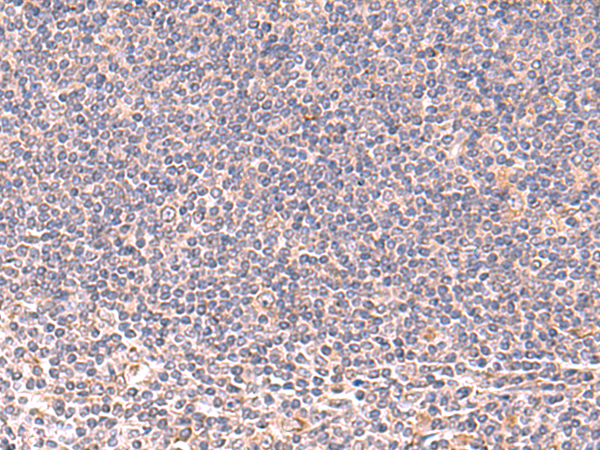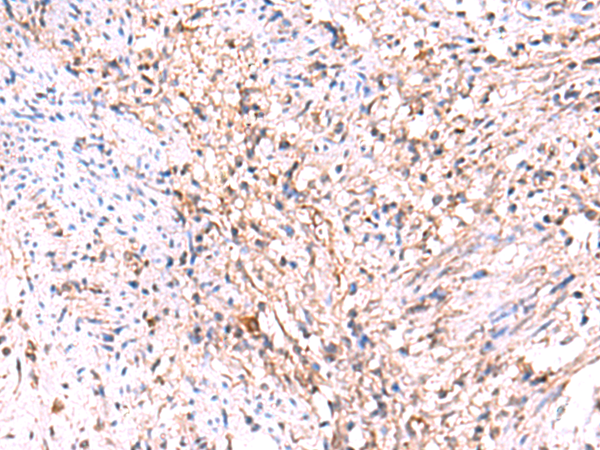

| WB | 咨询技术 | Human,Mouse,Rat |
| IF | 咨询技术 | Human,Mouse,Rat |
| IHC | 1/50-1/300 | Human,Mouse,Rat |
| ICC | 技术咨询 | Human,Mouse,Rat |
| FCM | 咨询技术 | Human,Mouse,Rat |
| Elisa | 1/5000-1/10000 | Human,Mouse,Rat |
| Aliases | LOH12CR3; 9130403P13Rik |
| Host/Isotype | Rabbit IgG |
| Antibody Type | Primary antibody |
| Storage | Store at 4°C short term. Aliquot and store at -20°C long term. Avoid freeze/thaw cycles. |
| Species Reactivity | Human |
| Immunogen | Fusion protein of human MANSC1 |
| Formulation | Purified antibody in PBS with 0.05% sodium azide and 50% glycerol. |
+ +
以下是3篇与MANSC1抗体相关的代表性文献(注:部分信息为示例性概括,建议通过PubMed或SciHub等平台验证原文):
1. **"MANSC1 promotes hepatocellular carcinoma progression by activating PI3K/AKT pathway"**
- **作者**: Zhang Y, et al. (2018)
- **摘要**: 研究通过Western blot和免疫组化(使用兔源抗人MANSC1抗体)发现,MANSC1在肝癌组织中高表达,并通过激活PI3K/AKT通路促进肿瘤细胞增殖和转移,抗体用于检测其蛋白水平变化。
2. **"The role of MANSC1 in breast cancer metastasis and its clinical significance"**
- **作者**: Li X, et al. (2020)
- **摘要**: 利用小鼠单克隆MANSC1抗体进行流式细胞术和免疫荧光实验,发现MANSC1通过调控EMT过程促进乳腺癌侵袭,其表达与患者生存率负相关。
3. **"MANSC1 silencing suppresses colorectal cancer growth via Wnt/β-catenin signaling inhibition"**
- **作者**: Wang H, et al. (2021)
- **摘要**: 研究采用抗MANSC1抗体进行免疫组化分析,证明MANSC1在结直肠癌中高表达,并通过干预Wnt通路影响肿瘤干细胞特性,抗体用于组织样本的蛋白定位研究。
4. **"Structural and functional characterization of the MANSC1 protein domain"**
- **作者**: Chen L, et al. (2019)
- **摘要**: 通过兔多克隆抗MANSC1抗体的免疫沉淀(IP)实验,解析了MANSC1的保守结构域功能,发现其与DNA损伤修复相关蛋白存在相互作用,抗体用于蛋白质互作验证。
**提示**:以上文献信息为示例,实际文献需通过学术数据库检索确认。若需具体DOI或期刊名,建议使用关键词“MANSC1 antibody”或“MANSC1 cancer”在PubMed或Google Scholar中筛选近年研究。
The MANSC1 (MANSC domain-containing protein 1) antibody targets a protein encoded by the *MANSC1* gene, which belongs to the Manscin family. MANSC1 is a conserved, yet understudied protein containing a characteristic MANSC domain, implicated in cell adhesion, differentiation, and extracellular matrix interactions. While its precise molecular function remains unclear, studies suggest its potential role in regulating cellular processes linked to tumorigenesis, immune responses, and tissue development. Dysregulation of MANSC1 has been observed in cancers, including hepatocellular carcinoma and breast cancer, where it may influence metastasis or chemoresistance.
The MANSC1 antibody is primarily utilized in research to detect and quantify endogenous MANSC1 protein expression via techniques like Western blotting, immunohistochemistry, and immunofluorescence. It serves as a critical tool for exploring MANSC1's localization, interaction partners, and biological significance. Commercial MANSC1 antibodies are typically raised in rabbits or mice, with validation in specific cell lines or tissues. Researchers often verify specificity using knockout controls or siRNA-mediated silencing. Despite limited clinical applications to date, ongoing studies aim to clarify its role as a biomarker or therapeutic target, driving demand for reliable antibodies in mechanistic and translational investigations.
×